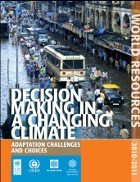This arresting question was raised at every stop on a recent visit to four European capitals to present the findings of the World Resources 2010-2011: Decision Making in a Changing Climate, which was jointly launched this week by the World Resources Institute, UNDP, UNEP and the World Bank.
The question came variably from journalists, think tankers, academics and government officials. Invariably, the US record on the issue was contrasted with China’s apparent boldness and resolve in embracing a low-carbon future. But it’s not just the US. Across the ‘free world’ governments appear to be shirking in front of the formidable challenges and difficult decisions that climate change throws up, backpedaling on earlier pledges and commitments as economic and financial turmoil knocks climate change in to the long grass, politically.
Is there something about democracies then that make them singularly ill-equipped to adapt to the vagaries of a changing climate? Could it be, for example, that the political myopia enforced by electoral cycles makes it inherently difficult for democracies to address long term issues? While the question is thought-provoking and in tune with the current mood of self-questioning and soul searching in the West, I wonder if anyone asking the question was seriously suggesting democracy be sacrificed on the altar of climate change adaptation. A recent Eurobarometer survey carried out in June 2011, indicates that public sentiment would in fact favour a higher prioritization of climate change than was the case the last time the poll was taken in 2009.
A reading of this World Resources Report 2011 suggests that the more important, useful (and interesting) question to pose is whether – regardless the political system in place – the decision-making process can be improved to make for more effective adaptations to a changing climate. A clear message from the report is that good decisions – i.e. those that are responsive, proactive, flexible, durable and robust to a range of climate outcomes – are the ones that are opened up to the public and grounded in participatory processes that are unmistakably democratic in character. Given the deep uncertainties and long time horizons characteristic of decisions relevant to climate change adaptation, effective public engagement is all the more critical to ensure legitimacy and durability of policy decisions. And public participation is important in another important regard: in ensuring that public values and interests are reflected in decisions about what constitutes acceptable levels of risk. On this point, see also Voice and Choice – an excellent report which delves deeper into the benefits of public participation in decision-making.
The findings of the World Resources Report 2010-11 are on the whole intuitive. The report is well worth a read in particular for the case studies of adaptation decision-making at the national level in the developing world which are particularly rich and illustrative of the inventiveness and initiative of governments of all political shades in adapting to a changing climate.





